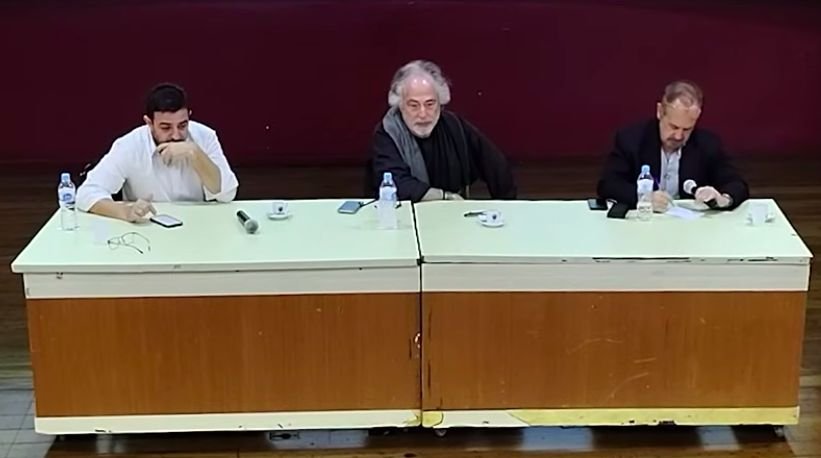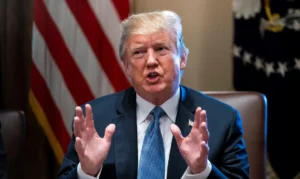
The recent aggressive moves by Donald Trump against Brazil have sparked a powerful wave of patriotic sentiment across the country, uniting moderate right and left-wing factions in defense of the Lula government and against the Bolsonaro family. This is the central theme of a discussion between renowned geopolitical analyst Pepe Escobar and economist Elias Jabbour, who see a “historic opportunity” for Brazil amidst the escalating trade tensions.
The swift and almost unanimous condemnation of Trump’s “monstrous 50% tariffs” on Brazilian products has exposed the desperation within Bolsonaro’s base. Bolsonaro’s supporters, including figures like journalist Paulo Figueiredo (grandson of dictator João Figueiredo) and Congressman Eduardo Bolsonaro, initially attempted to deflect blame, crying “it’s Lula’s fault.” However, as public backlash intensified, Figueiredo swiftly pivoted, trying to redirect the blame to Justice Alexandre de Moraes.
Meanwhile, some Bolsonaro-aligned politicians, such as São Paulo Governor Tarcísio de Freitas, found themselves unable to distance from Bolsonaro and explicitly aligned with Trump, drawing widespread condemnation on social media. Even Trump’s own social media accounts were flooded with thousands of Brazilians criticizing his actions and defending Brazilian sovereignty.
Trump’s Letter: A Fabric of Lies
The core of this strong Brazilian reaction lies in Donald Trump’s letter to President Lula – a document described as “intellectually incapable” and full of “contradictions and explicit lies.”
The most glaring falsehood, according to the analysis, is Trump’s claim of a U.S. trade deficit with Brazil. Trump asserted that “Brazil has benefited from unfair trade practices” and complained of a “significant trade deficit.” This, the article emphatically states, “simply does not exist.”
Trump’s letter also demanded that “Brazil needs to treat the United States more fairly in trade,” completely ignoring the historical fact that Brazil consistently buys more American products than it sells. The letter further contained “grotesque interferences in Brazilian internal affairs,” with Trump demanding explanations about judicial processes that are entirely outside the Lula government’s purview.
Debunking the Deficit Myth: The Numbers Speak
To fully grasp the extent of Trump’s misinformation, a look at historical trade data is crucial. Since 1998, Brazil has run a trade deficit with the United States in 18 out of 28 years analyzed.
While Brazil’s largest goods deficit occurred in 2022 (US$ 12.6 billion), it also registered a small surplus in 2024 (US$ 1.1 billion) before returning to a deficit in 2025 (US$ 1.7 billion). Over the past 15 years, Brazil has accumulated a goods trade deficit of US$ 84 billion with the United States.
When the service sector is included, the U.S. advantage becomes even clearer. Between 2010 and 2024, total trade in goods and services between Brazil and the U.S. amounted to US$ 1.24 trillion, equivalent to 4.28% of the U.S. GDP in 2024. For comparison, the U.S. military budget in 2024 was US$ 841.4 billion.
In the service sector alone, the United States accumulated a surplus of US$ 40.5 billion with Brazil between 2010 and 2024, with a US$ 8.9 billion surplus in 2024. Over this 15-year period, Brazil exported US$ 562 billion in goods and services and imported US$ 687 billion, resulting in an accumulated American surplus of US$ 125 billion. This demonstrates that the U.S. has a lot to lose if it engages in a full-blown trade war with Brazil.
Key Brazilian Exports to the U.S.
The article highlights critical Brazilian exports that would be significantly impacted by the tariffs, and for which the U.S. has a strong reliance:
- Brazilian Coffee: Represents 23.3% of all U.S. coffee imports, making Brazil the primary supplier. The U.S. domestic production is less than 1% of its consumption, making imports essential.
- Iron Ore: Brazil maintains an average share of 62.4% in U.S. iron ore imports. With the U.S. and Europe having largely depleted their own reserves, Brazil’s vast reserves (like Carajás with 190 billion tons) are crucial.
- Brazilian Meat: Brazil accounts for 21.7% of all U.S. frozen beef imports, totaling US$ 1.3 billion out of a US$ 6.1 billion market. This sector supports thousands of jobs in both countries.
Brazil as a Strategic Market for American Products
Counter to Trump’s narrative, Brazil is a fundamental market for various American products, purchasing billions annually in strategic sectors:
- Civil Aircraft, Engines, and Parts: US$ 10.5 billion over the last 12 months, representing 7.8% of all U.S. exports in this sector.
- Chemical and Industrial Products: Brazil accounts for 41.1% of U.S. sodium hydroxide exports (US$ 608 million), essential for various industries.
- Fertilizers: Brazil is critical, representing 33.6% of U.S. sulfur exports, 28% of potash fertilizers, and 22.9% of miscellaneous fertilizers.
- Energy Products: Brazil imports US$ 4.8 billion in petroleum oils and diesel (4.2% of U.S. exports) and US$ 1.8 billion in crude oil (1.7% of U.S. exports).
Overall, Brazil’s imports of just the top five American products (aircraft, petroleum oils, crude oil, polymers, and medicines) exceed US$ 20 billion annually.
Eduardo Bolsonaro’s “Complete Absence of Patriotism”
These aggressive actions by Trump follow the recent BRICS meeting, where Brazil actively engaged in trade diversification strategies. Trump has been attacking BRICS for days, even threatening 10% tariffs on all member countries.
The article highlights the “shocking” behavior of the Brazilian far-right, particularly Eduardo Bolsonaro, who publicly thanked Trump for the 50% tariff decision. This is described as “unprecedented anti-patriotism,” as he chose to align with someone attacking Brazil with lies instead of defending his own country. The irony is underscored by the fact that Eduardo Bolsonaro is financially supported by his father, Jair Bolsonaro, whose funding comes from productive sectors that will be directly harmed by these very tariffs.
Resistance and National Sovereignty
The article concludes on a note of confidence, asserting that “the Brazil of today is not the Brazil of old.” With a diversified trade flow, particularly through engagement with BRICS, Brazil is not existentially dependent on the United States. If the U.S. is unwilling to do business, Brazil can diversify its markets.
A final, “cruel irony” is pointed out: it is American importers, not Brazil, who pay these tariffs. While Bolsonaro supporters try to label the Lula government as a “taxer,” it is President Donald Trump who is “dramatically taxing his own businesses.”








